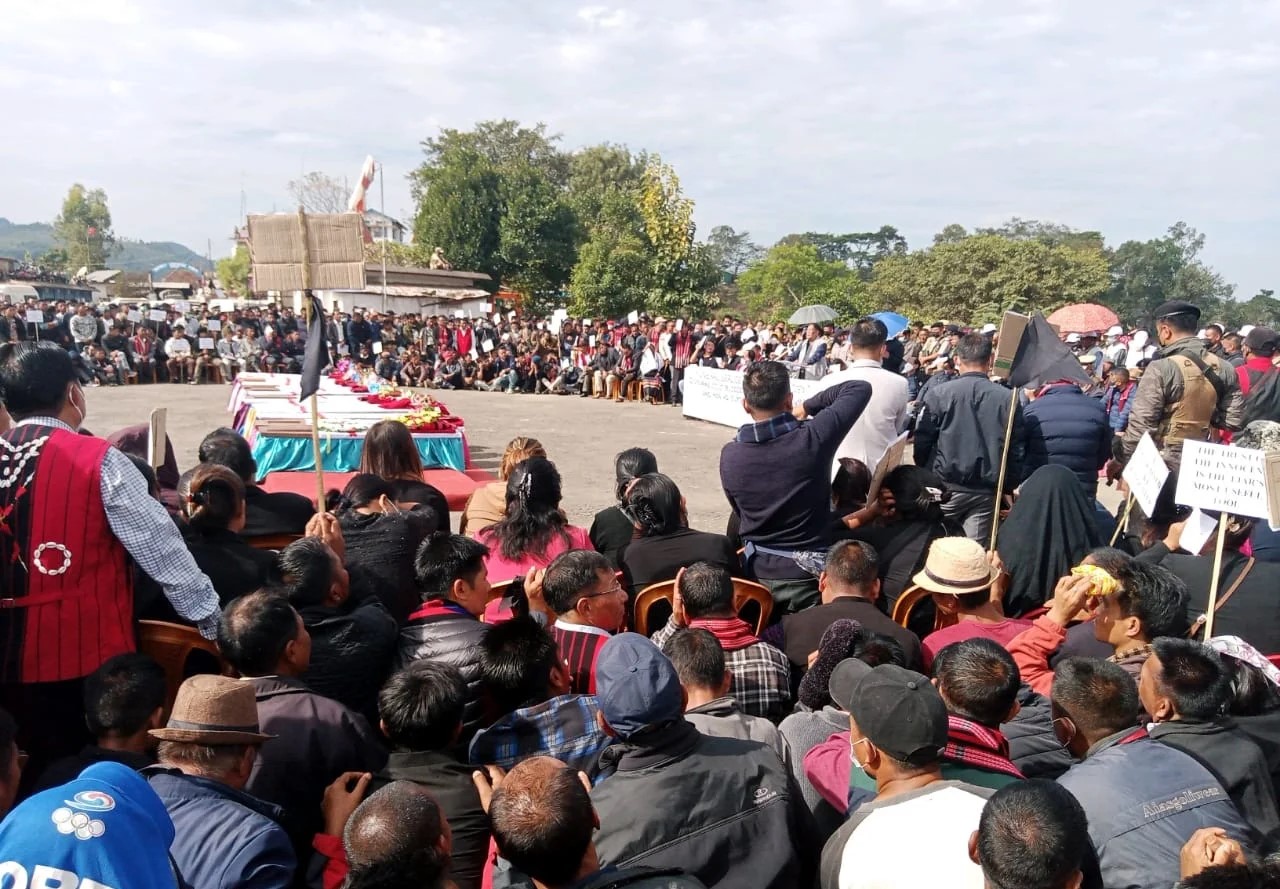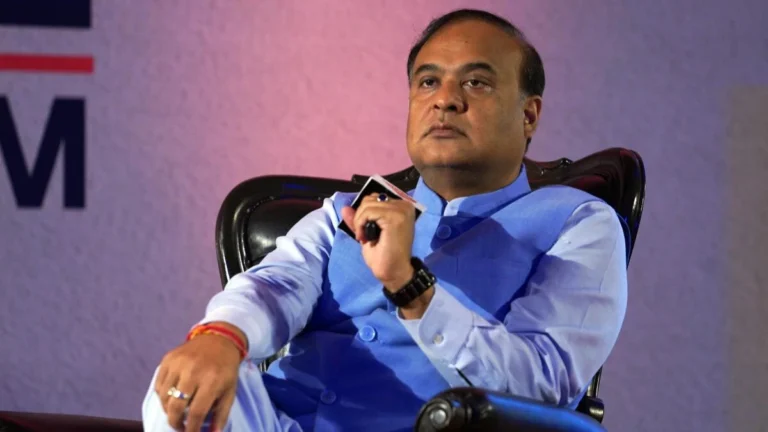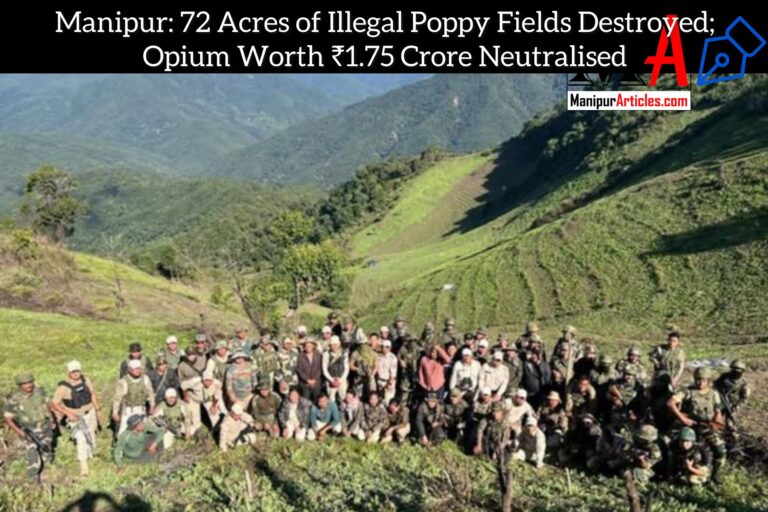GNF Condemns SC’s Decision to Terminate Criminal Proceedings Against Army in Oting Massacre Case
Summary of the News
In a recent statement, the Global Naga Forum (GNF) strongly condemned the Supreme Court’s decision to terminate criminal proceedings against the Indian Army involved in the Oting massacre case. This tragic event occurred in Nagaland’s Mon district in December 2021, where 14 civilians lost their lives due to a botched military operation. The GNF emphasized the lack of justice and called for accountability, urging for the protection of human rights in the region.
A Controversial Decision: SC Terminates Criminal Proceedings in Oting Massacre Case
In a significant turn of events, the Supreme Court of India has decided to terminate the criminal proceedings against the army personnel involved in the Oting massacre. This decision has triggered widespread outrage, particularly among the Naga community and human rights advocates. The Oting massacre, a tragic incident that took place in December 2021 in Nagaland, resulted in the deaths of 14 civilians. Since then, calls for justice have echoed throughout the region, and the recent decision has sparked a renewed debate on accountability and human rights.
What Happened in Oting?
On December 4, 2021, a group of civilians traveling in a pickup truck was mistaken for insurgents by an Indian Army unit in Nagaland’s Mon district. In a botched military operation, the army opened fire on the civilians, killing six of them on the spot. The situation worsened when a subsequent altercation led to the deaths of eight more civilians and a soldier. This incident, now referred to as the Oting massacre, sent shockwaves throughout the country and led to widespread protests.
The Indian Army initially claimed that the incident was a case of mistaken identity during a counter-insurgency operation. However, the scale of the tragedy and the loss of innocent lives raised serious questions about the operation’s planning, execution, and the rules of engagement followed by the army.
Supreme Court’s Decision and Its Repercussions
The Supreme Court’s recent decision to halt criminal proceedings against the army personnel involved has been met with sharp criticism. Human rights organizations, civil society groups, and political leaders have voiced their concerns, questioning the implications of such a move on justice and accountability. For many, this decision feels like a step back in the fight for human rights and justice for the victims’ families.
The Role of the Armed Forces Special Powers Act (AFSPA)
One of the underlying issues that has come to the forefront in the aftermath of the Oting massacre is the Armed Forces Special Powers Act (AFSPA). This controversial law grants the Indian armed forces sweeping powers to operate in certain regions, including Nagaland, without facing legal repercussions. Under AFSPA, army personnel are protected from prosecution for actions taken while on duty, unless the central government grants permission for legal proceedings.
In the case of the Oting massacre, the Supreme Court’s decision aligns with AFSPA’s provisions, raising questions about the law’s implications on human rights. Critics argue that AFSPA enables impunity for the armed forces, while supporters maintain that the law is necessary to combat insurgency in the region.
Global Naga Forum’s Condemnation
The Global Naga Forum (GNF) has been one of the most vocal critics of the Supreme Court’s decision. In a statement, the GNF condemned the termination of criminal proceedings, emphasizing that it undermines the quest for justice. The forum also highlighted the emotional and psychological trauma that the incident has inflicted on the people of Nagaland, particularly the families of the victims.
The GNF’s statement called for accountability and urged both the Indian government and the international community to pay closer attention to the human rights situation in Nagaland. The forum also reiterated its stance on the repeal of AFSPA, which it believes contributes to the culture of impunity in the region.
The Broader Impact of the Decision
The Supreme Court’s decision has implications that go beyond the Oting massacre. It raises important questions about the balance between national security and human rights in regions affected by insurgency and conflict. While the government argues that laws like AFSPA are essential for maintaining order, human rights activists point out the dangers of unchecked power.
Justice for the Victims
For the families of the victims, the court’s decision has been a bitter pill to swallow. Many had hoped that the legal process would bring accountability and closure to a painful chapter in their lives. Now, with the termination of criminal proceedings, there is a growing sense of frustration and disappointment. The question remains: Will justice ever be served?
What’s Next for Nagaland?
The Oting massacre and the subsequent legal developments have reignited the debate over AFSPA and its role in regions like Nagaland. While the Supreme Court’s decision may be final for now, the conversation about the law’s relevance and its impact on human rights is far from over. Activists, political leaders, and civil society groups continue to push for reforms, while the people of Nagaland are left grappling with the consequences of the massacre.
Conclusion: A Call for Accountability
The Supreme Court’s decision to terminate criminal proceedings against the army in the Oting massacre case has left many feeling disillusioned. For the victims’ families, the decision represents a denial of justice. For the Naga community, it is yet another reminder of the challenges they face in their quest for dignity and human rights. Moving forward, it’s essential that the Indian government takes steps to address these concerns, not only to provide justice for the Oting victims but also to ensure that such incidents never happen again.
FAQs
- What was the Oting massacre?
- The Oting massacre occurred in December 2021 when the Indian Army mistakenly fired upon civilians in Nagaland’s Mon district, resulting in 14 civilian deaths.
- Why did the Supreme Court terminate criminal proceedings?
- The court’s decision aligns with the provisions of the Armed Forces Special Powers Act (AFSPA), which grants immunity to the armed forces operating in certain regions.
- What is AFSPA, and why is it controversial?
- AFSPA is a law that grants the military special powers in certain regions. It is controversial because it provides immunity to the armed forces, often leading to accusations of impunity.
- What is the Global Naga Forum’s stance on the decision?
- The Global Naga Forum has condemned the Supreme Court’s decision, calling it a denial of justice and a step back for human rights in Nagaland.
- What are the broader implications of this decision?
- The decision has raised concerns about the balance between national security and human rights, particularly in regions affected by insurgency and conflict.
Tags: GNF Condemns SC’s Decision to Terminate Criminal Proceedings Against Army in Oting Massacre Case
Summary of the News
In a recent statement, the Global Naga Forum (GNF) strongly condemned the Supreme Court’s decision to terminate criminal proceedings against the Indian Army involved in the Oting massacre case. This tragic event occurred in Nagaland’s Mon district in December 2021, where 14 civilians lost their lives due to a botched military operation. The GNF emphasized the lack of justice and called for accountability, urging for the protection of human rights in the region.
A Controversial Decision: SC Terminates Criminal Proceedings in Oting Massacre Case
In a significant turn of events, the Supreme Court of India has decided to terminate the criminal proceedings against the army personnel involved in the Oting massacre. This decision has triggered widespread outrage, particularly among the Naga community and human rights advocates. The Oting massacre, a tragic incident that took place in December 2021 in Nagaland, resulted in the deaths of 14 civilians. Since then, calls for justice have echoed throughout the region, and the recent decision has sparked a renewed debate on accountability and human rights.
What Happened in Oting?
On December 4, 2021, a group of civilians traveling in a pickup truck was mistaken for insurgents by an Indian Army unit in Nagaland’s Mon district. In a botched military operation, the army opened fire on the civilians, killing six of them on the spot. The situation worsened when a subsequent altercation led to the deaths of eight more civilians and a soldier. This incident, now referred to as the Oting massacre, sent shockwaves throughout the country and led to widespread protests.
The Indian Army initially claimed that the incident was a case of mistaken identity during a counter-insurgency operation. However, the scale of the tragedy and the loss of innocent lives raised serious questions about the operation’s planning, execution, and the rules of engagement followed by the army.
Supreme Court’s Decision and Its Repercussions
The Supreme Court’s recent decision to halt criminal proceedings against the army personnel involved has been met with sharp criticism. Human rights organizations, civil society groups, and political leaders have voiced their concerns, questioning the implications of such a move on justice and accountability. For many, this decision feels like a step back in the fight for human rights and justice for the victims’ families.
The Role of the Armed Forces Special Powers Act (AFSPA)
One of the underlying issues that has come to the forefront in the aftermath of the Oting massacre is the Armed Forces Special Powers Act (AFSPA). This controversial law grants the Indian armed forces sweeping powers to operate in certain regions, including Nagaland, without facing legal repercussions. Under AFSPA, army personnel are protected from prosecution for actions taken while on duty, unless the central government grants permission for legal proceedings.
In the case of the Oting massacre, the Supreme Court’s decision aligns with AFSPA’s provisions, raising questions about the law’s implications on human rights. Critics argue that AFSPA enables impunity for the armed forces, while supporters maintain that the law is necessary to combat insurgency in the region.
Global Naga Forum’s Condemnation
The Global Naga Forum (GNF) has been one of the most vocal critics of the Supreme Court’s decision. In a statement, the GNF condemned the termination of criminal proceedings, emphasizing that it undermines the quest for justice. The forum also highlighted the emotional and psychological trauma that the incident has inflicted on the people of Nagaland, particularly the families of the victims.
The GNF’s statement called for accountability and urged both the Indian government and the international community to pay closer attention to the human rights situation in Nagaland. The forum also reiterated its stance on the repeal of AFSPA, which it believes contributes to the culture of impunity in the region.
The Broader Impact of the Decision
The Supreme Court’s decision has implications that go beyond the Oting massacre. It raises important questions about the balance between national security and human rights in regions affected by insurgency and conflict. While the government argues that laws like AFSPA are essential for maintaining order, human rights activists point out the dangers of unchecked power.
Justice for the Victims
For the families of the victims, the court’s decision has been a bitter pill to swallow. Many had hoped that the legal process would bring accountability and closure to a painful chapter in their lives. Now, with the termination of criminal proceedings, there is a growing sense of frustration and disappointment. The question remains: Will justice ever be served?
What’s Next for Nagaland?
The Oting massacre and the subsequent legal developments have reignited the debate over AFSPA and its role in regions like Nagaland. While the Supreme Court’s decision may be final for now, the conversation about the law’s relevance and its impact on human rights is far from over. Activists, political leaders, and civil society groups continue to push for reforms, while the people of Nagaland are left grappling with the consequences of the massacre.
Conclusion: A Call for Accountability
The Supreme Court’s decision to terminate criminal proceedings against the army in the Oting massacre case has left many feeling disillusioned. For the victims’ families, the decision represents a denial of justice. For the Naga community, it is yet another reminder of the challenges they face in their quest for dignity and human rights. Moving forward, it’s essential that the Indian government takes steps to address these concerns, not only to provide justice for the Oting victims but also to ensure that such incidents never happen again.
FAQs
- What was the Oting massacre?
- The Oting massacre occurred in December 2021 when the Indian Army mistakenly fired upon civilians in Nagaland’s Mon district, resulting in 14 civilian deaths.
- Why did the Supreme Court terminate criminal proceedings?
- The court’s decision aligns with the provisions of the Armed Forces Special Powers Act (AFSPA), which grants immunity to the armed forces operating in certain regions.
- What is AFSPA, and why is it controversial?
- AFSPA is a law that grants the military special powers in certain regions. It is controversial because it provides immunity to the armed forces, often leading to accusations of impunity.
- What is the Global Naga Forum’s stance on the decision?
- The Global Naga Forum has condemned the Supreme Court’s decision, calling it a denial of justice and a step back for human rights in Nagaland.
- What are the broader implications of this decision?
- The decision has raised concerns about the balance between national security and human rights, particularly in regions affected by insurgency and conflict.






